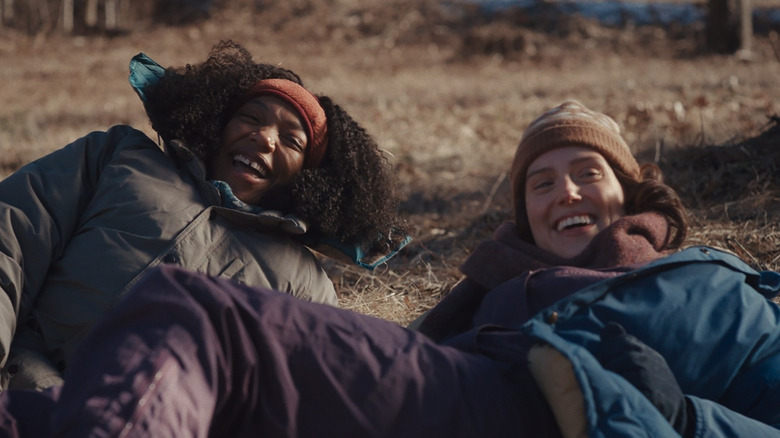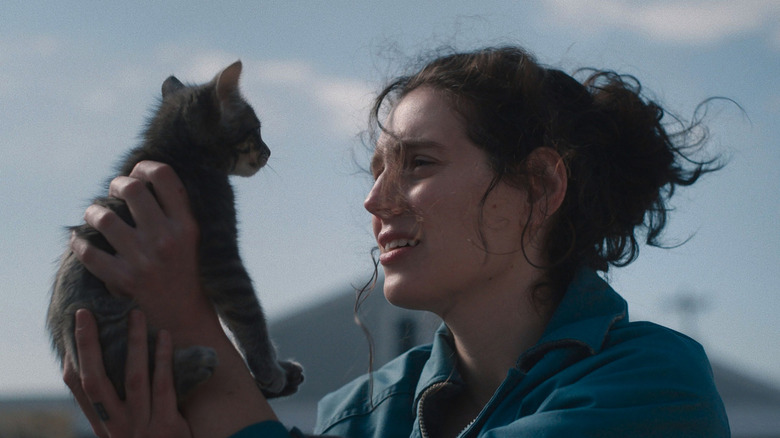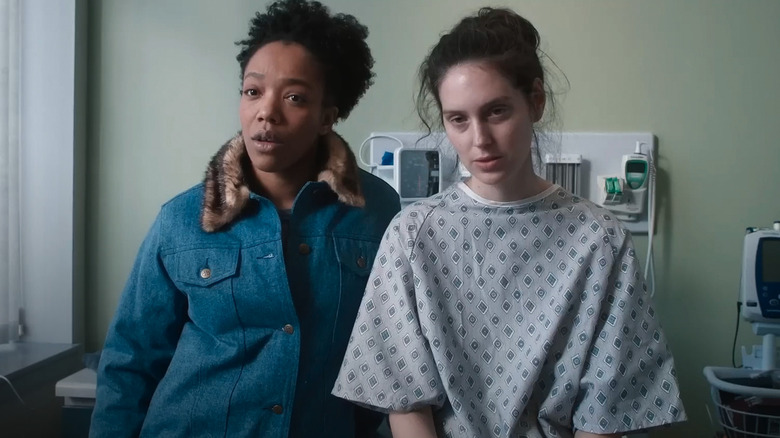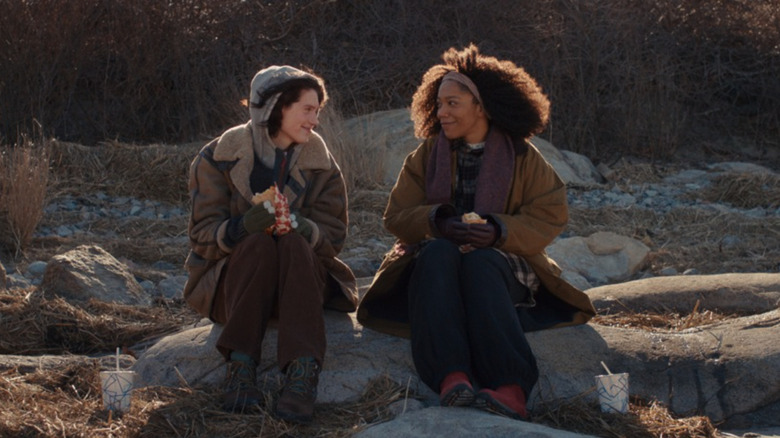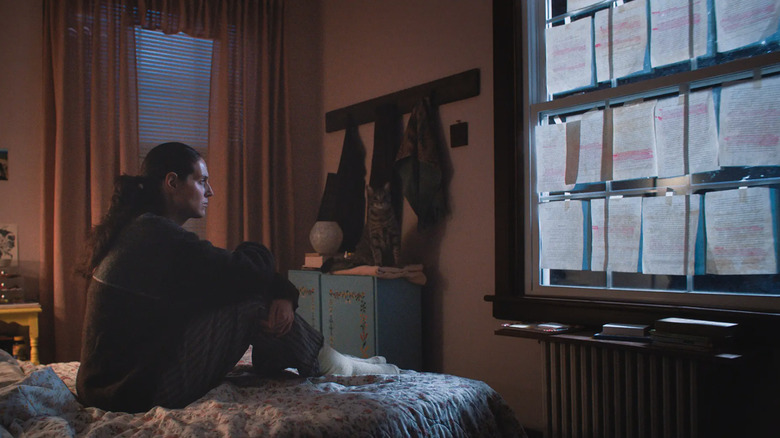A24's Sorry, Baby Director And Stars On Finding Humor In Horrible Situations [Exclusive Interview]
Eva Victor's "Sorry, Baby" is one of the most inspired feature directorial debuts in recent memory — effortlessly funny with their matter-of-fact sense of humor one moment, and viscerally gutting the next. As the writer, director, and star of a deeply personal story, Victor has crafted a work that is mesmerizing in its humanity, honesty, and tenderness. The movie is quietly staggering, a warm hug to keep you safe from the tragedy lingering in the wings. It's frankly astonishing to recognize that Victor's debut is also one of the best films of the year, and whatever they do next should excite film lovers the world over.
Told in a non-linear fashion, "Sorry, Baby" is the story of Agnes (Victor) and Lydie (Naomi Ackie), two best friends who serve as each other's port in a storm, and showcase their platonic love for each other after Agnes endures the unthinkable while the two are working toward their PhDs. "Sorry, Baby" is not interested in exploiting trauma for the sake of dramatic tension, but instead accentuates the complicated feelings we're forced to navigate when it feels like our world has stopped, but life just keeps happening. One of the high points of 2025's Sundance Film Festival, Victor's phenomenal work is now available to watch in theaters and is undoubtedly one of the best films ever distributed by A24.
I recently spoke with Victor, Ackie, and co-star Lucas Hedges (of "Lady Bird" and the equally devastating "Boy Erased" fame) about the film and how it relates to all of their lives, an intimate conversation that only made me love the film even more than I already did.
Note: This interview has been lightly edited for clarity and brevity.
Sorry, Baby was always meant to be a nonlinear story
I think a lot of audiences, and even critics sometimes, roll their eyes at films that are told in non-linear chapters, but I found it really refreshing that we see Agnes and Lydie all these years later, and we immediately become attached to their bond as friends. Because once people know that a person has gone through something traumatic, they do see them differently, and they treat them differently, whether subconsciously or not. So when this reveal of the bad thing that happens does happen, I think that it calms a bit of that visceral reaction that audiences usually have when we talk about these sorts of stories. Was this always envisioned as a non-linear story, or when you were writing it, did it feel like it demanded a non-linear story?
Victor: Thank you for saying all that. I feel like your understanding of why I made that choice is exactly right about wanting to present them with joy, and to see them as full people before you see what happened so that you can't really dismiss them, and make them simpler later for your own benefit or to dismiss what they went through, or what Agnes went through. So, yes, I always wrote it as a non-linear story, and I always wanted to start with the friendship, and the joy of the friendship to sort of set up that the film is about this kind of healing friendship. And also, to just let us laugh at the beginning to set up that there will be moments of humor throughout the film.
We had to get to know them, because otherwise, if you go chronologically, the film starts with this defining bad thing that happened, when really this film is about people, and how they're trying to cope. So, yes, non-linear from the get, and honestly, I feel like people keep saying, "The structure's crazy," and it's like, actually, one chapter is out of place, and the rest is chronological. So it's not that crazy.
Right. It's pretty easy to figure out what's going on. I've talked to some colleagues who even said, "I watched the trailer, and I thought it was going to be about something else," and I was like, "How? Sure, okay."
Victor: Everyone thinks that Lydie's dead.
Ackie: What?!
Victor: Everyone thinks you're a ghost.
Yep. I saw a bunch of comments on the trailer from people being like, "Oh, so the best friend's dead and a ghost. Figured it out. Nice job, A24!"
Hedges: That's so funny.
Ackie: Is this from comments on YouTube? Because you should never read the comments on YouTube, personally.
It's where media literacy goes to die.
Ackie: Amen.
Naomi Ackie knew Eva Victor was 'a true writer'
Naomi, I've just been so continually impressed by the projects that you've chosen for yourself, just even in the last two years alone. So, in reading this script, what was your "Oh, I have to be a part of this" moment?
Ackie: I feel like the thing that attracted me to this script was the humanness of the characters. It was a real invitation to pare everything back. I feel like Eva writes in this ... the rhythm of the words is Eva's personality.
Victor: Oh, that's nice.
Ackie: Do you know what I mean?
Victor: Oh my God.
Ackie: It feels like I was reading work from a true writer, and there was something so exciting about knowing that the writer was also acting in it, and was also directing it. I wanted to be of service to that. And then, the story itself, I just think it is so important. Eva's spoken so much about wanting this film to be about love and healing, and I believe those things should be in the world as much as highlighting the kind of subject matter itself. It's as important to look at the individual, and tap into what that process means. So it felt like it was covering so many different grounds, for me, that I couldn't not do it.
Victor: I'm so lucky.
Speaking to that writing, the movies that I love most in the world, I classify under this umbrella of, "I'm sorry if your life hasn't been sad enough to find this funny." So I cannot begin to explain what a relief it was to watch this character who has endured this horrible experience, and a friend who is going to process and help carry the weight of this horrible experience, and less than 24 hours later, they're cracking jokes about it, which is very much how I deal with all of the traumas in my life as well. And so, this question is for all three of you: What goes into finding a way to balance that tone where it feels authentic to how I think people actually do, a lot of times, process trauma and interact with trauma?
Victor: Yeah. I think, honestly, a lot of how I feel like the script was able to be funny in moments is just by playing it with as much honesty as possible. And even the doctor's performance, he was doing a real dropped-in job, and I think that allows it to land as funny for us because we are finding that absurd, but he doesn't think he's being funny. So I feel like, honestly, humor is all about being legitimately super serious, and then saying something that doesn't totally make sense.
Ackie: I agree.
Hedges: I feel like, actually, life is inherently really funny, and I feel like most writers just maybe aren't tapped in as much to what's actually happening on a — like, they're writing something else, and it's actually more ... I had a writing teacher tell me once, "We go up laughing, and we come down crying." And it was sort of like this idea of, the moment everything works out is the moment right before you start crying, that those two things are like –
Ackie: Intertwined.
Hedges: Yeah. I guess just that most brilliant things have that kind of paradox, or just inherent complexity baked into them. So I don't remember exactly what your question was, but I guess just that it's much easier, actually, to do it the way it is in life when it's set up as such. It's probably harder to impose that way of naturalism onto something that's written kind of two-dimensionally.
Agnes and Lydie's friendship is the heart of Sorry, Baby
I am so obsessed with the relationships between all of these characters, especially Agnes and Lydie, because I think a lot of ... speaking of sometimes misunderstanding naturalism, I think a lot of people write best friends as like, "Oh, the sidekick," and not a fully realized person who is one of the most important people in someone's life. My best friend certainly saves mine every day. So I'd love to hear how the two of you, as actors, were able to find that chemistry and make this relationship feel so lived-in.
Ackie: You know what I just thought as you said that? [Eva] has spoken a lot about [their] best friend, and I've spoken a lot about my best friend, and I think there is something ... it actually feels like the most natural thing to play.
Victor: Yeah. It's like when you're stripped back all the way and not self-conscious, basically. That's actually hard, but...
Ackie: It's hard, but if you have the right person doing it against you, you can do that. The prerequisite of being a best friend to someone is allowing someone to strip back and be themselves.
Victor: It's actually a huge honor. It's so fun to give someone that opportunity–
Ackie: To do that.
Victor: Yeah, it's so nice.
Ackie: It felt so easy.
Victor: And it was so fun. I mean, Naomi's legitimately made of the sun [laughs], and gets along with everyone, and is so ... she's just so easy to be around. I said this all yesterday, but she can have chemistry with a wall. She's so charismatic. It's the most insane thing I've ever experienced. There were a lot of times when I would look at her for too long, and I'd be like, "Okay, you have to focus." I'd be like, "Whoa, she's so awesome and pretty."
Ackie: The thing is, I felt the same, and I do think that plays a part in it because best friends are in love.
Victor: Yeah, true.
Ackie: There is something romantic.
Victor: It's so awesome.
Ackie: It is so awesome.
Victor: You're kind of always like, "Why me? Why did I get so lucky?"
Ackie: "What did I do so right? How did we find each other?" So there is something so magical about that. And actually, when you really enjoy sitting in an atmosphere of that, I think it just makes the words make sense. So I was actually pretty lucky, because a lot of the space I inhabit in the film is that friendship space that even makes ... I was thinking about the scene when I'm sleeping in Decker's class, how much fun that was. But also how I remember with my best friend, f***ing hell, the science classes we'd have that were so eye-burningly f***ing boring, and yet we would be having the most fun.
Victor: It's so fun to be somewhere you're not supposed to be.
Ackie: And laugh when you're not supposed to laugh when that person makes everything f***ing fun. Friends are just so great, man.
The meta therapy of playing Agnes for Eva Victor
When I talk about who's my soulmate, it's like, yeah, I have my wife and I'm married, and that's wonderful, but my best friend will always be the first love of my life because I've known her for 20 years. She knows more about me than I probably know about myself, at this point. So I love seeing a movie that honors the truths of those friendships. Society's weird about friends. We don't appreciate them the way that we should.
Ackie: I don't think we do.
Victor: Literally.
Hedges: But we will, but we will.
And Eva, there's this kind of meta thing happening with you as the writer, as the director, as the star, that you're almost sort of engaging in roleplay therapy. I'm curious how that affected your performance as an actor or your performance as a director.
Victor: Well, I spent a lot of time trying to figure out the ways in which Agnes was different from me in order to just actually be able to be an actor, and not just try to put myself on camera. And I wrote Agnes to be deliberately a little more blunt than me, and a little more comfortable in silence. So I kind of got to explore. Usually, when you're trying to create a character, you spend time trying to figure out the ways into how that person feels close to you, and I feel like the joy of making Agnes here for me was figuring out the ways that I'm not like her so that I could really play in the places that are different.
Yes, I mean, it's not one thing to be tasking myself with this. Obviously, there were a lot of euphoric moments of feeling really heard, which felt really good considering the topic of the film, and then there were also moments that were really hard, and I would dissociate on the weekends and watch "Real Housewives" in the bath. But that's life, and I love my life.
I only have time for one last question, so I'm not actually going to even ask a question. Just while I have you all here, I would be remiss to not thank, especially Eva and Naomi, between "Blink Twice" and "Sorry, Baby," you've both starred in these movies that really showcase, I think, the massive range of emotions and pathways for catharsis after this unthinkable violation that is unfortunately very real for a lot of people, myself included. And so, I just really wanted to thank you both.
Victor: That's so nice. Thank you so much for saying that.
Thank you for making such meaningful art, because it is not a question, it's a fact. No kiss-ass junket behavior. I sincerely mean it from the bottom of my heart. I really want to thank you both for what you've put out into the world.
Victor: Thanks.
Ackie: Thank you so, so much.
Victor: That's very sweet. We literally love that.
Ackie: Thank you. You're wonderful.
"Sorry, Baby" is now in select theaters and will open nationwide on July 25, 2025.
